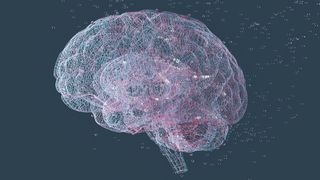New astronauts have changes in their brains after their first long-duration mission
The findings could have implications for long-duration space missions.

Astronauts who go on their first long-duration space mission have differences in their brains compared with the brains of more experienced astronauts and those of people who have never been to space — specifically, growth in the spaces in the brain where cerebrospinal fluid flows, a new study finds.
Though scientists have known that being in space alters and potentially damages the brain, the study is one of the first to address a specific aspect of brain health in space using a comparative method and a relatively large group of astronauts.
Cerebrospinal fluid, the clear fluid that surrounds the brain and spinal cord, behaves differently in microgravity, leading the researchers to wonder what impact spaceflight might have on these areas. The findings may help scientists better understand how being in space affects the human brain.
Related: Long space missions can change astronaut brain structure and function
These studies are especially important for long-duration missions; NASA plans to send astronauts to the moon in the coming years as part of the agency's Artemis program and, eventually, to Mars — a journey estimated to take nearly two years.
"These findings have important implications as we continue space exploration," senior author Dr. Juan Piantino, an assistant professor of pediatrics in the Oregon Health & Science University School of Medicine's Division of Neurology, said in a statement.
The researchers used magnetic resonance imaging (MRI) to scan the brains of 15 astronauts, nine of whom were "novices," meaning they were completing their first mission in space and had no prior spaceflight experience. Sixteen ground-based employees of NASA's Johnson Space Center in Houston served as a control group for comparison purposes.
Get the Space.com Newsletter
Breaking space news, the latest updates on rocket launches, skywatching events and more!
Researchers examined the perivascular spaces (PVS), the spaces where cerebrospinal fluid flows in the brain, of each astronaut before and immediately after their time in space. They also took scans one, three and six months after the astronauts returned to Earth.
The researchers found that the total PVS volume of novice astronauts increased after their trips to space. The PVS of experienced astronauts, by contrast, did not show this growth — in fact, their total PVS volume actually decreased. This may indicate that their brains "reached some kind of homeostasis," Piantino said in a statement. In other words, their brains may have adjusted more to microgravity after previous spaceflight.
In fact, the researchers found that the total PVS volume of experienced astronauts before their current flight tended to be higher, and that this baseline volume correlated with previous amount of time spent in space. Though neither of these trends were statistically significant, meaning they could have happened by chance, they fit with previous research suggesting that changes in the brains of astronauts depend on the total time spent in space and the frequency of space missions.
Although PVS volume gradually increases as people age, the members of the Earth-based control group did not experience the kind of PVS changes that the novice astronauts showed. The PVS are part of the glymphatic system, which clears out waste from the brain, mostly during sleep. Other health conditions — such as dementia and hydrocephalus, or the buildup of too much fluid in the brain's ventricles — can affect these spaces. The results of the new study may help to address the effects on these brain structures that result from health conditions on Earth.
"These findings not only help to understand fundamental changes that happen during spaceflight, but also for people on Earth who suffer from diseases that affect circulation of cerebrospinal fluid," Piantino said in the statement.
The results, as well as the findings of other studies that have investigated the effects of spaceflight on the brain and cerebrospinal fluid, hint at the profound influence of gravity on the evolution of humans and all life on Earth. The body and the brain did not evolve to be in a microgravity environment, and previous research has already provided clues as to the variety of health effects linked to time spent in microgravity, such as brittle bones and problems with balance.
This research "forces you to think about some basic fundamental questions of science and how life evolved here on Earth," Piantino said.
The research was published May 5 in the journal Scientific Reports,
Follow us on Twitter @Spacedotcom and on Facebook.
Join our Space Forums to keep talking space on the latest missions, night sky and more! And if you have a news tip, correction or comment, let us know at: community@space.com.

Rebecca Sohn is a freelance science writer. She writes about a variety of science, health and environmental topics, and is particularly interested in how science impacts people's lives. She has been an intern at CalMatters and STAT, as well as a science fellow at Mashable. Rebecca, a native of the Boston area, studied English literature and minored in music at Skidmore College in Upstate New York and later studied science journalism at New York University.
